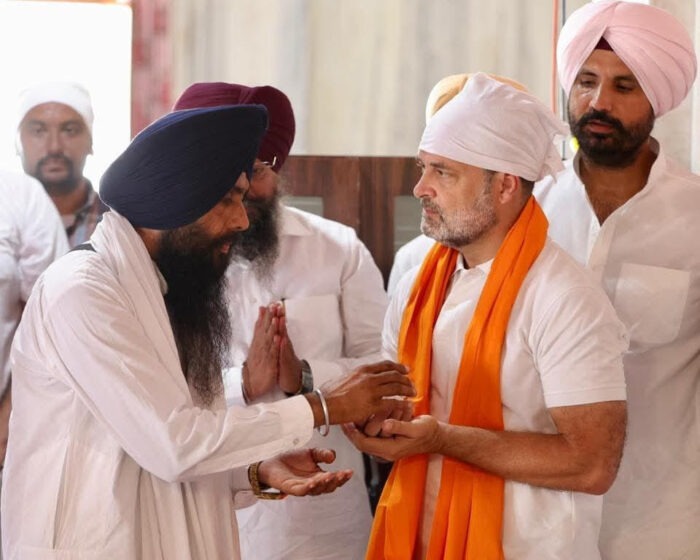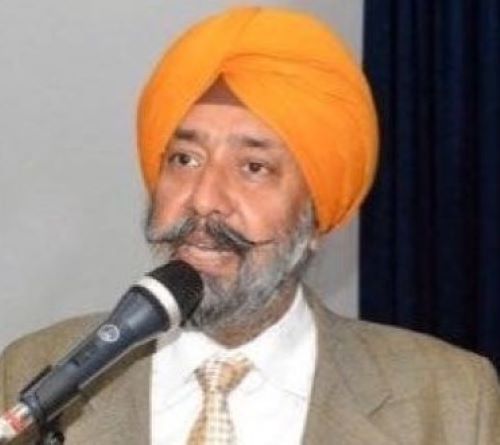 On 15 September 2025, Rahul Gandhi, Congress leader and Leader of the Opposition in the Lok Sabha, visited Gurdwara Baba Budha Sahib at Ramdas, tehsil Ajnala, during a tour of Ravi-ravaged, flood-affected villages in Amritsar and Gurdaspur. During his visit, he was presented with a siropa (robe of honour) inside the sanctum precincts (video). The Shiromani Gurdwara Parbandhak Committee (SGPC), which manages this historic gurdwara, quickly objected, citing its directive that political leaders and VIPs are not to be ceremonially honoured within gurdwaras.
On 15 September 2025, Rahul Gandhi, Congress leader and Leader of the Opposition in the Lok Sabha, visited Gurdwara Baba Budha Sahib at Ramdas, tehsil Ajnala, during a tour of Ravi-ravaged, flood-affected villages in Amritsar and Gurdaspur. During his visit, he was presented with a siropa (robe of honour) inside the sanctum precincts (video). The Shiromani Gurdwara Parbandhak Committee (SGPC), which manages this historic gurdwara, quickly objected, citing its directive that political leaders and VIPs are not to be ceremonially honoured within gurdwaras.
Within days, the SGPC suspended the granthi Bhai Kulwinder Singh and two other staff members, transferred the shrine’s manager with a warning, and made these punitive actions public. The matter escalated further when the banned US-based Khalistani outfit Sikhs for Justice (SFJ) issued threats to Punjab Congress leaders for facilitating the honour. Thus, what might have been a quiet matter of internal protocol enforcement was turned into a controversy of state-wide proportions, with potentially international repercussions.
My Perspective: Why the Handling Was Unjustified
I am neither an unconditional votary of the Congress ideology nor a great personal admirer of Rahul Gandhi, although I do feel he is discharging his duties as Leader of the Opposition quite effectively. Yet, in my view, the SGPC’s handling of this incident was not entirely appropriate. Maryada (religious discipline) must be respected: if the rule bars siropas for political leaders inside the sanctum, it should indeed be observed. But enforcing maryada does not require public theatre. A discreet correction and internal reminder would have sufficed. By resorting to suspensions, transfers, and publicity, the SGPC converted a manageable protocol lapse into an avoidable public spectacle.
This approach did not enhance the SGPC’s stature; on the contrary, it handed extremist organisations a fresh opportunity to provoke Sikh sentiments. Instead of calming the waters, the SGPC stirred them. The institution’s responsibility is to safeguard sanctity and lead with composure, not to provide political ammunition to any outfit—within or outside the country.
Historical Responsibility and the Spirit of Sikhism
The wounds of 1984 remain raw. I have repeatedly maintained that Indira Gandhi bears sole responsibility for Operation Blue Star, and Rajiv Gandhi and his cohorts are squarely culpable for the anti-Sikh pogrom that followed her assassination. But to impute responsibility to Rahul Gandhi—then a minor—is neither just nor true to the Guru’s path.

Sikhism is an inclusive faith, welcoming people of every caste, creed, and background to bow before Sri Guru Granth Sahib, revered by Sikhs worldwide as the manifestation of the eternal living Guru. Extending a siropa in this instance was not a political endorsement but simply an acknowledgement of a devotee’s presence—one who had voluntarily come to pay obeisance at the Guru’s door (dwar). By overreacting, the SGPC has, in effect, projected the broader spirit of the Panth in a parochial and narrow manner.
Punjab’s Verdicts: People Decide, Not the SGPC
In a democracy, it is for the people to decide who should be rewarded or punished in the political arena. Since Operation Blue Star, Punjab has thrice elected Congress-led governments with Sikh Chief Ministers—Beant Singh in 1992 and Captain Amarinder Singh in 2002 and 2017—and many Sikh MLAs. This is the people’s verdict, of Sikhs as well as non-Sikhs.
That being the case, one must ask: what authority does the SGPC have to extend or withhold legitimacy on partisan grounds? Its role is gurdwara management, not political arbitration. By acting otherwise, the SGPC risks exposing itself as little more than a political instrument of the Badal faction of the Shiromani Akali Dal—an impression widely held across Punjab.
Check 1: Are the Rules Applied Equally?
A pertinent question arises: since the issuance of these non-public directives against siropas for politicians in sanctums, has the SGPC itself ever permitted leaders of the Shiromani Akali Dal or its allies to be similarly honoured at Sri Darbar Sahib, Amritsar? If the answer is yes, then the selective indignation in this case reveals double standards. True maryada requires impartiality; anything less smacks of expedience.
Check 2: Giani Harpreet Singh’s Reaction
The breakaway Shiromani Akali Dal faction led by Giani Harpreet Singh, former Jathedar of Akal Takht, reacted strongly. Giani Harpreet Singh condemned the siropa presentation to Rahul Gandhi, arguing that honouring a Gandhi family member disregarded Sikh historical grievances, particularly Operation Blue Star and the 1984 pogrom.
Yet, in doing so, his faction inadvertently lent legitimacy to the SGPC’s position, treating it as the official religious and political mouthpiece of the Sukhbir Badal–led Akali Dal. This highlights the paradox: while criticising the incident, the rival faction has reinforced the SGPC’s contested role as both religious custodian and political actor. In effect, both Akali factions have used the controversy to sharpen their partisan battles, leaving the Sikh Sangat caught in between.
In Summary: A Call for Renewal and Inclusivity
This is not the first time Rahul Gandhi has visited a Punjab gurdwara. On earlier occasions, he quietly participated in selfless langar seva at Sri Darbar Sahib without fanfare. Against that backdrop, the SGPC’s response to his recent siropa at Ramdas, during the course of his visit to the flood-ravaged border areas of Punjab—what can at best be described as a disproportionate reaction—was neither necessary nor appropriate. This was an utterly avoidable controversy, born of selective enforcement, politicisation, and needless escalation. If a breach occurred, the correction should have been private and dignified, not turned into public drama. Instead, the SGPC exposed itself as a political tool in the hands of the Badal group, fuelling embarrassment for itself, the Shiromani Akali Dal, and the wider Sikh community—without even securing the political dividends it may have sought.
The SGPC is a gurdwara management body, not the conscience-keeper of Punjab’s or the Sikh community’s electoral past. Its real duty is to uphold sanctity, ensure discipline, and embody inclusivity. To that end, I reiterate: fresh SGPC elections, overdue since 2011, must be held immediately. Only a renewed mandate can restore credibility, insulate the SGPC from partisan manipulation, and return it to its rightful role—serving the Panth in the inclusive spirit of the Guru.